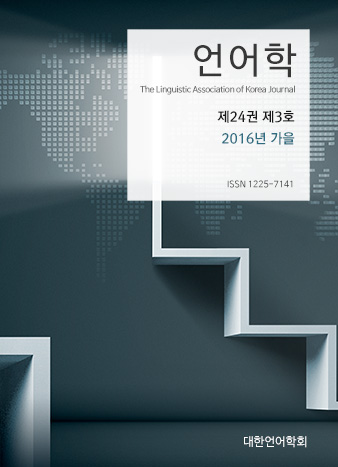대한언어학회 전자저널

24권 3호 (2016년 9월)
Abstract
Kang, Hyunsook. (2016). Perceptual deletion of onset /n/ in Korean. The Linguistic Association of Korea Journal, 24(3), 1-16. This paper examines varying degrees of perceptibility of Korean /n/ in /nasal-nV/ contexts. Two perception tests were conducted and showed that onset /n/ was often confused to a null segment if the following vocoid is /j/ or /i/. Since it is the non-prominent segment that is often confused to a null value or to an adjacent segment (Cote, 2000), the findings in this paper support the suggestion in Jun (2015) who argues that Korean /n/ shows low perceptibility before /j/ or /i/ based on /n/-insertion in /C-j/ and /C-i/ that results in /nasal-nj/ and /nasal-ni/ sequences. That both /n/-insertion in Jun (2015) and /n/-confusion in this paper occur in the same contexts support P-map theory in Steriade (2009), namely that the segment with lowest perceptibility is more likely to be inserted or deleted.
Keywords
# perceptual deletion # onset /n/ in Korean # P-map theory
References
- Cote, M. (2000). Consonant cluster phonotactics: a perceptual approach. Unpublished doctoral dissertation. MIT. Boston, MA.
- Jun, J.-H (2015) Korean n-insertion: a mismatch between data and learning. Phonology, 32, 417-458.
- Kang, O.-M. (2003). Korean phonology. [Hankwuke umwunlon.] Seoul: Thaehaksa.
- Kim, C.-W. (1970). Boundary phenomena in Korean. Papers in Linguistics, 2, 1-26.
- Kim-Renaud, Y.-K. (1974). Korean consonantal phonology. Doctoral dissertation. University of Hawaii. Published 1991, Seoul: Hanshin.
- Kim, Y.-P., Park, S., Ahn, B. & Lee, B. (2002). An overview of studies of Korean /n/-insertion. [Niun sapiphyensanguy yenkwusacek kemtho.] Emwunnoncip, 46, 43-71.
- Ko, K.-M. (1992). n-epenthesis and sai-sios in Korean. [Niun chemkawa saisioseytayhanyenkwu.] Eoneohak, 14, 31-51.
- Recasens, D. (1983). Place cues for nasal consonants with special reference to Catalan. Journal of the Acoustical Society of America, 73, 1346-1353.
- Steriade, D. (2001). Directional asymmetries in place assimilation: a perceptual account. In E. Hume & K. Johnson (Eds.), The role of speech perception in phonology (pp. 219–250). San Diego, CA: Academic Press.
- Steriade, D. (2009). The phonology of perceptibility effects: the P-map and its consequences for constraint organization. In K. Hanson & S. Inkelas (Eds.), The nature of the word: studies in honor of Paul Kiparsky (pp. 151-179). Cambridge, Mass.: MIT Press.
- Zee, E & Lee, W. (2008). The articulatory characteristics of the palatals, palatalized velars and velars in Hakka Chinese. In 8th International Seminar on Speech Production ISSP.